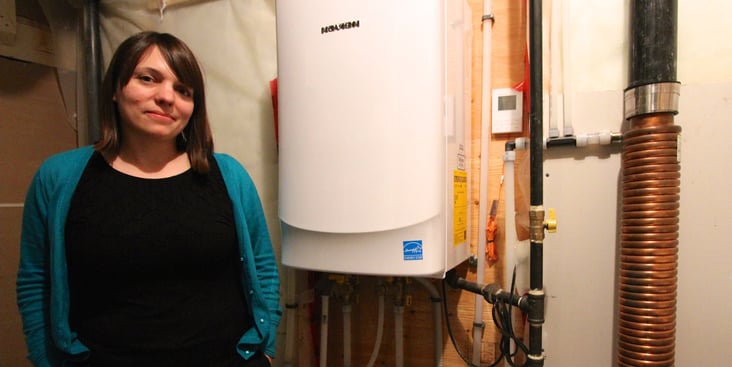This post is one in a series featuring the complete slate of advanced energy technologies outlined in the report This Is Advanced Energy.

Water heating technology spans a range of options, from conventional technologies to renewable systems. Conventional storage water heaters typically use natural gas or electricity to keep water hot in an insulated tank, ready for use at any time. They have a simple design and are relatively inexpensive, but they also have standby losses associated with storing hot water for long periods of time. High-efficiency models increase heat transfer efficiency and reduce standby losses with more insulation. Tankless (instantaneous) water heaters eliminate standby losses by heating a stream of water on demand, though simultaneous use of hot water devices may be limited. Heat pump water heaters are electric water heaters that use heat pump technology (usually used for space heating/ cooling) instead of electric resistance coils to heat hot water. Like air conditioners and refrigerators, heat pumps move heat from one place to another instead of generating heat directly – in this case, from the surrounding air into the hot water tank. They are typically two to three times more efficient than conventional electric resistance units. Solar hot water systems harness the sun’s energy using solar thermal collectors. They typically require a larger storage tank and a backup fuel (such as electricity or natural gas) for times when the sun cannot produce enough hot water.
ENERGY STAR rated water heaters made up 11% of the gas water heating market and 1% of the electric water heating market in 2011, leaving significant room for further market penetration. Customers in many areas can get rebates from their electric utilities for the purchase of an efficient water heater. Energy savings from efficient water heating is not limited to the residential sector. By installing a solar pool heating system recommended by Johnson Controls, the Glen Hills Middle School in Wisconsin will save $5,000 annually, with a payback period of just 3.5 years. The U.S. market for high-efficiency water heaters was an estimated $2.1 billion in 2014, an increase of 61% over 2013.
The average U.S. household spends $400 to $600 on water heating each year. Efficient water heaters can use 10% to 50% less energy than standard models, with actual savings varying by the size and location of the heater and water pipes. Dating back to 1990, the Department of Energy has promulgated energy efficiency standards for water heaters. The latest standards went into effect in 2015, and are expected to deliver an estimated $63 billion in cumulative savings for products shipped from 2015 to 2044.
Download the full report at the link below:
